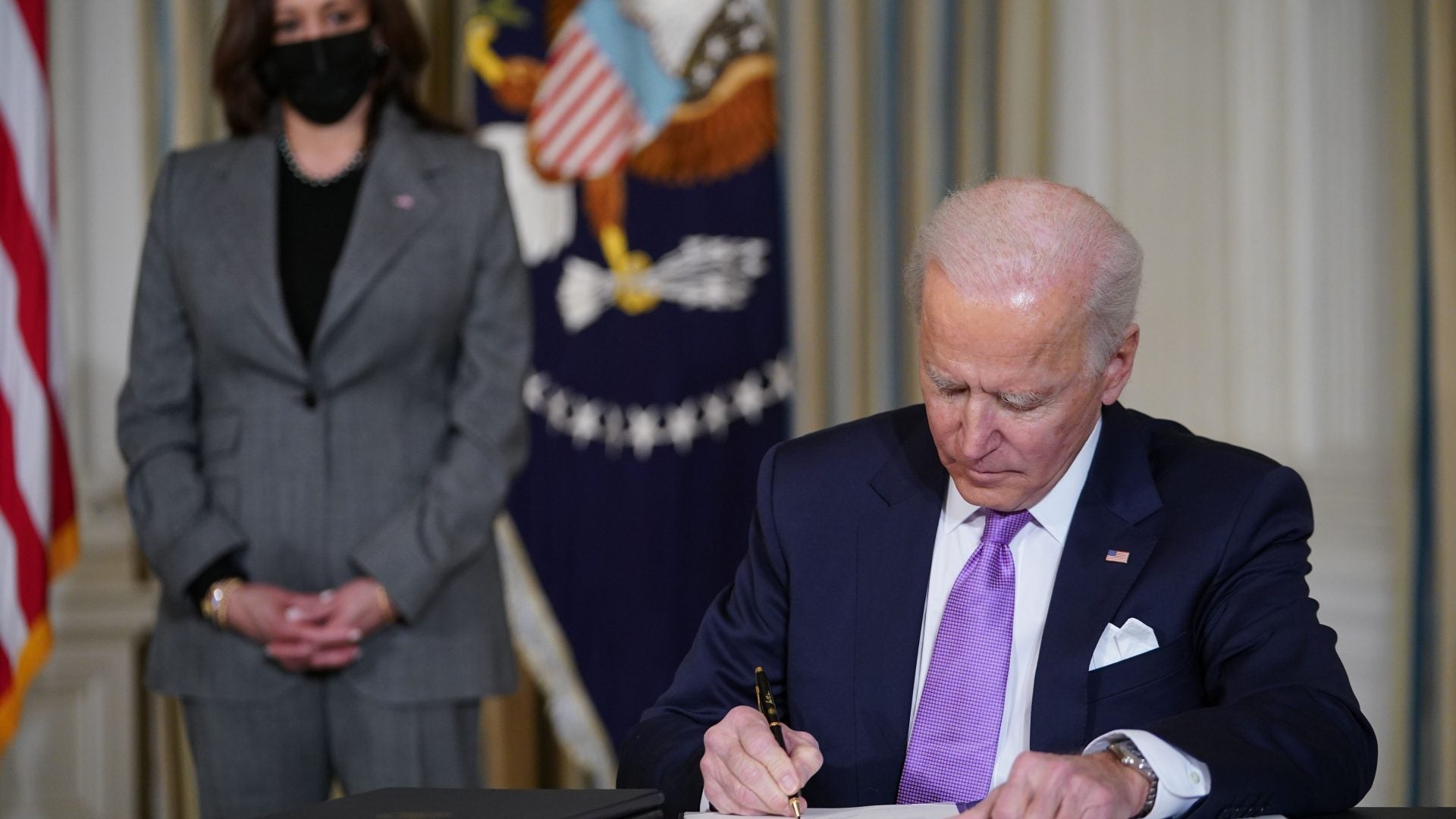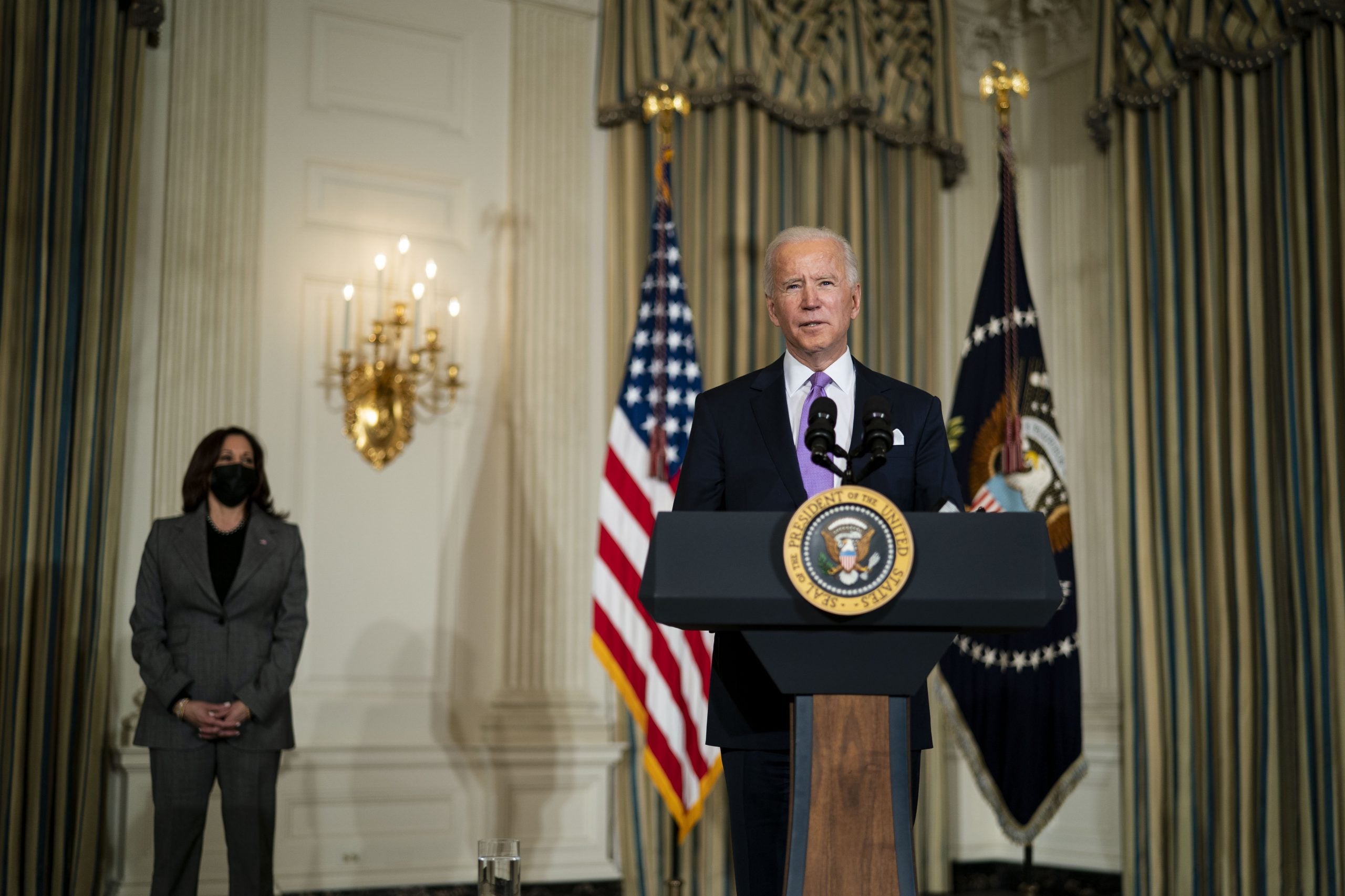
Washington, D.C. — Saying the “soul” of America “will be troubled as long as systemic racism is allowed to persist,” President Joe Biden is using the power of his office to address some of the nation’s racial inequities.
As Vice President Kamala Harris looked on, Biden signed a series of executive orders on Tuesday, January 26. The four actions aim to redress discriminatory federal housing policies; end the government’s use of private prisons; respect Tribal sovereignty; and combat xenophobia against Asian Americans and Pacific Islanders.
“We have never fully lived up to the founding principles of this nation, to state the obvious, that all people are created equal and have a right to be treated equally throughout their lives,” said Biden, who spoke for about 15 minutes in the State Dining Room. Besides the vice president, Senior White House aides Cedric Richmond, Symone Sanders and Domestic Policy Advisor Susan Rice, were among those present, along with members of the press. “And it’s time to act now, not only because it’s the right thing to do, but because if we do, we’ll all be better off for it.”
Here’s a look at what Biden signed yesterday related to racial equity in America.
Advance Fair Housing
President Biden signed a Presidential Memorandum “Redressing Our Nation’s and the Federal Government’s History of Discriminatory Housing Practices and Policies.” It recognizes the central role the federal government has played implementing housing policies across the United States, from redlining to mortgage discrimination to destructive federal highway construction, that have had racially discriminatory impacts. The Fair Housing Act requires the federal government to advance fair housing and combat housing discrimination, including disparate impact discrimination that appears neutral, but has an unjustified discriminatory effect in practice. This Presidential Memorandum directs the Department of Housing and Urban Development (HUD) to examine the effects of the Trump Administration’s regulatory actions related to fair housing policies and laws. It also directs HUD officials to take steps necessary based on that analysis to fully implement the Fair Housing Act’s requirements.
Reform America’s Incarceration System to End the Use of Private Prisons
More than two million people are currently incarcerated in the U.S., and they’re disproportionately Black and/or people of color. Mass incarceration imposes significant costs on society and communities, the White House said, while private prisons profiteer off of federal prisoners in what critics allege are less safe conditions for both prisoners and correctional officers alike. The order directs the attorney general not to renew Department of Justice contracts with privately operated criminal detention facilities.

Reaffirm the Federal Government’s Commitment to Tribal Sovereignty and Consultation
The Biden Administration says it is committed to re-establishing federal respect for tribal sovereignty. That means strengthening the Nation-to-Nation relationship between the federal government and American Indian and Alaska Native Tribes, empowering self-determination, and advancing racial justice for Native communities. The Executive Order reinvigorates the commitment of all federal agencies to engage in regular, robust, and meaningful consultation with tribal governments.
Combat Xenophobia Against Asian American and Pacific Islanders
Discrimination against African Americans and other people of color is a long-standing issue in America. In the past year, rates of harassment and violence against Asian Americans and Pacific Islanders (AAPIs) have risen dramatically. Various AAPI leaders have said former President Donald Trump’s derogatory rhetoric about the coronavirus (calling it the “kung flu” and “Chinese virus”) contributed to the hostile climate. Biden’s Presidential Memorandum acknowledges the harm that these actions have caused, and establishes that the policy of the new administration is to condemn and denounce anti-Asian bias and discrimination. The Memorandum directs the Department of Health and Human Services, in coordination with the COVID-19 Health Equity Task Force, to consider issuing guidance describing best practices. These practices would advance cultural competency, language access, and sensitivity towards AAPIs in the federal government’s COVID-19 response. It also directs the Department of Justice to partner with AAPI communities to prevent hate crimes and harassment.
